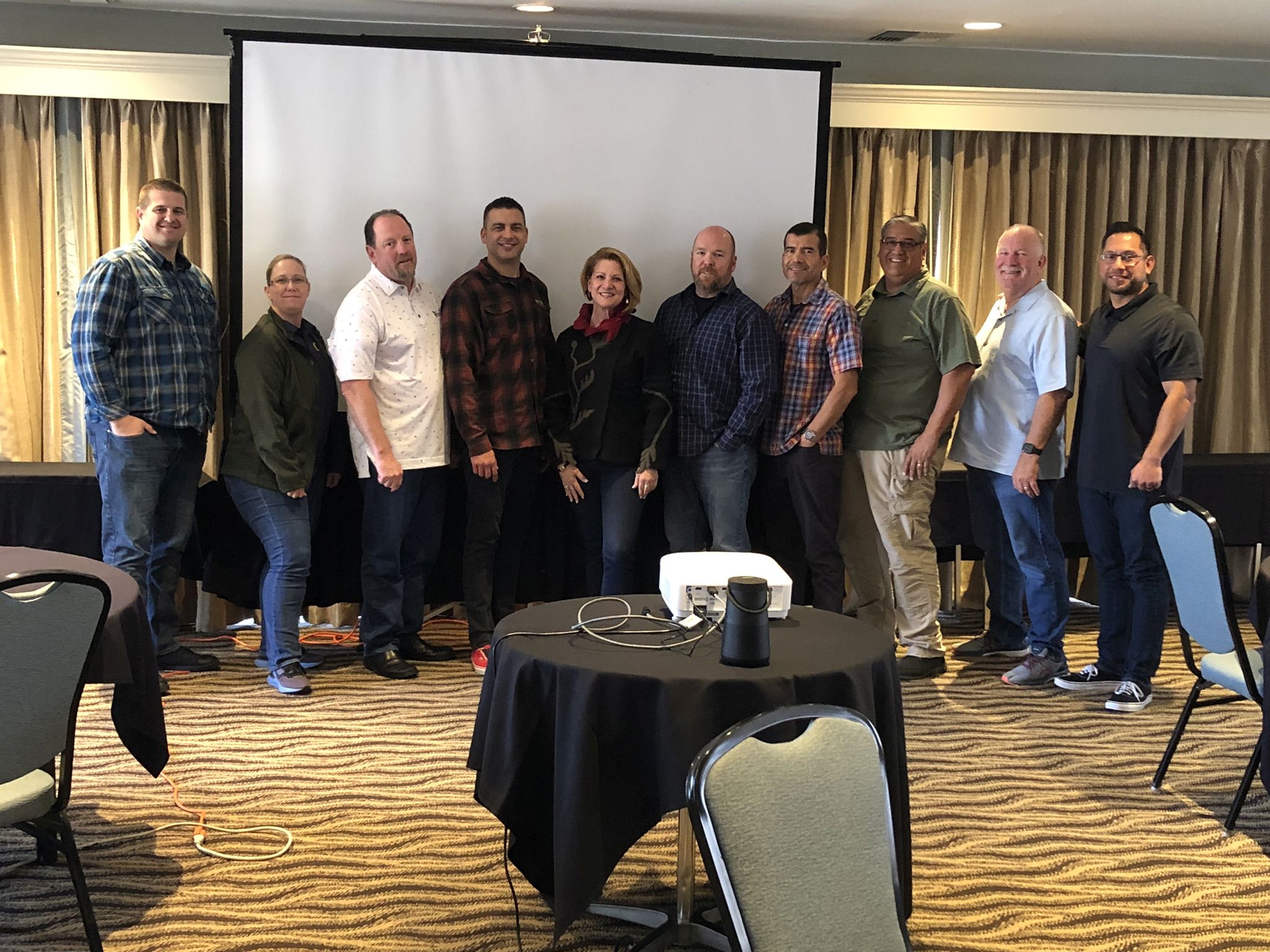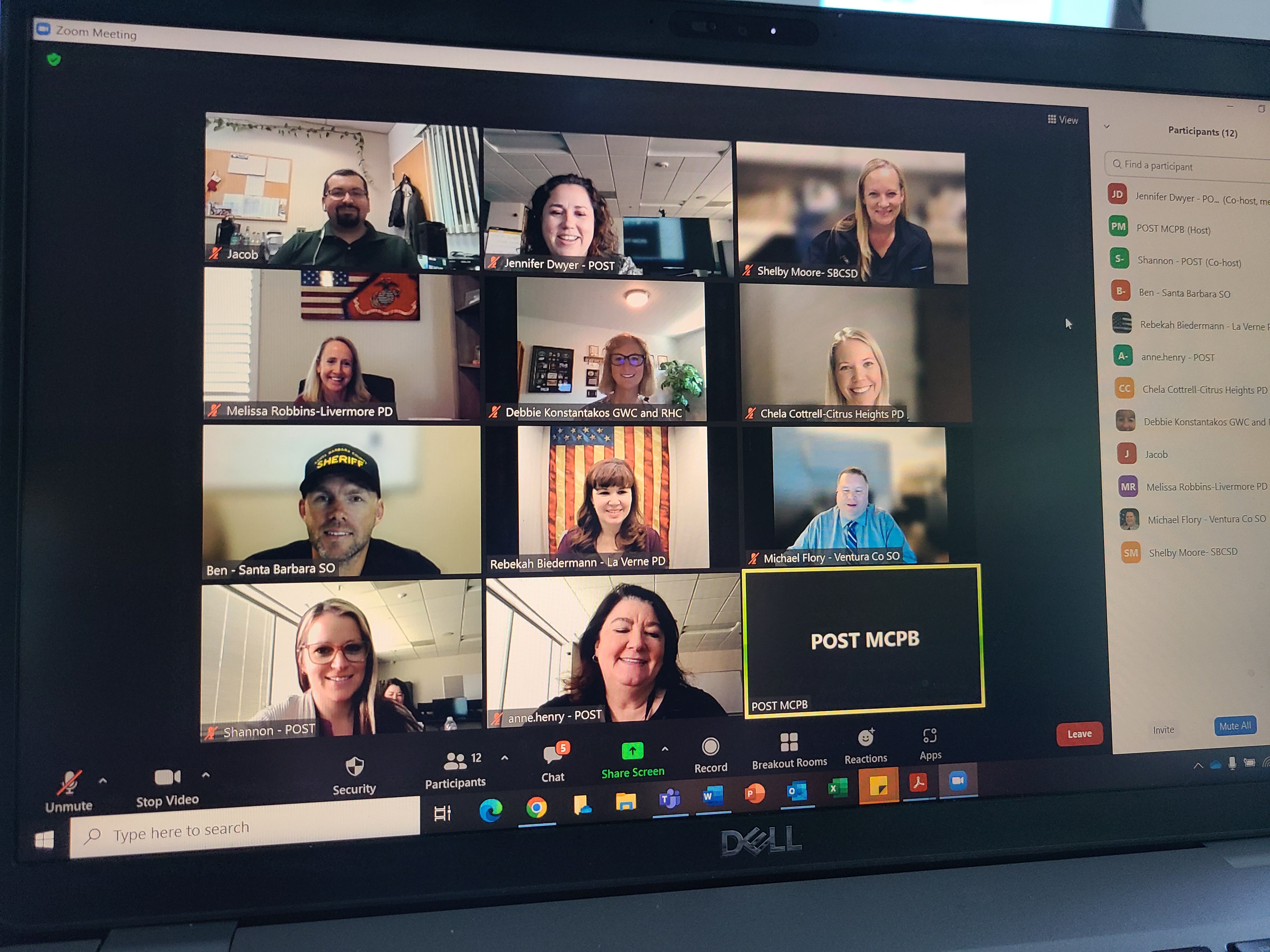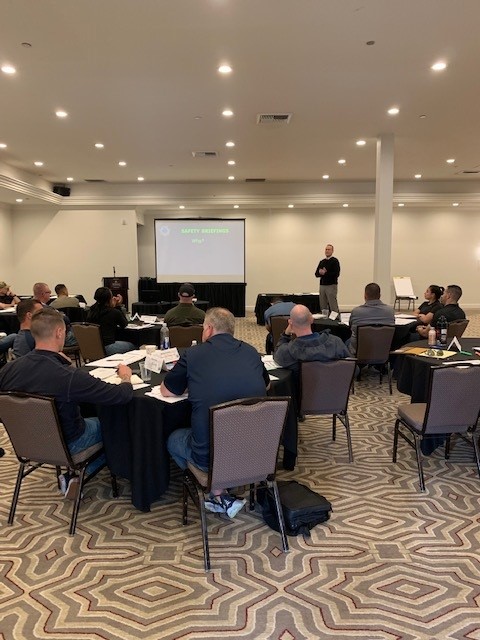Training Program Services Holds Second Workshop for the Supervisory Course Curriculum Committee
 Supervisory Course Curriculum Workshop
Supervisory Course Curriculum Workshop
On April 11-14, 2022, the Training Program Services Bureau held the second three-day Supervisory Course Curriculum Update Workshop in Monterey. Representing several presenters, 11 subject matter experts (SMEs) returned for the second workshop, which kicked off with feedback on the updated modules piloted between the two meetings.
The SMEs continued reviewing and updating the instructor guides, PowerPoints, handouts, and videos of seven modules. The California Victim’s Bill of Rights Act of 2008 was updated in the Legal Issues and Internal Affairs module. The following modules have been reviewed; Counseling, Communicating with a Diverse Workforce, Critical Incident Management, Followership, Situational Leadership, Team Building, and Use of Force. The Supervisory Course Expanded Course Outline will be updated to reflect all content changes. In addition, a new module that will satisfy the mandate for California Electronic Communications Privacy Act has been developed. This module will be referred to as Hi-Tech Crimes in the Supervisory Course Network. The Hi-Tech Crimes module was piloted by one of the SMEs from the last workshop, and changes were made to the instructional material based on the feedback of the students. Members of the Supervisory Course Network will receive a notification as the revised content is uploaded.
For questions regarding Supervisory Course Curriculum Development Workshop or the Supervisory Course, please contact Jim Katapodis, Senior Consultant in the Training Program Services Bureau, at (916) 204-5587.
Public Safety Dispatchers’ Basic Course Workshop
 Public Safety Dispatchers Basic Course Workshop
Public Safety Dispatchers Basic Course Workshop
On April 5-6, 2022, the Management Counseling and Projects Bureau hosted a two-day workshop with a group of Public Safety Dispatcher SMEs. The focus of this workshop was updating LD 109 - Law Enforcement Telecommunications and LD 111 – Resources/Referral Services. The updates to LD 109 are remarkable, and the group came together to really make sure that dispatchers are given a thorough introduction to California Law Enforcement Telecommunications System (CLETS) in the Basic Course. LD 111 has been updated and will still focus on the resources and referral services that public safety dispatchers provide to citizens when they call in for assistance. Workshops are two days long and take place once a month, either online or in person.
If you are interested in being considered as a subject matter expert for additional POST Public Safety Dispatcher projects, please contact Jennifer Dwyer, Staff Services Manager/Project Manager in the Management Counseling and Projects Bureau, at (916) 227-0477.
Basic Training Bureau Hosts Recruit Training Officer (RTO) Course in Del Mar, CA
 Recruit Training Officer Course Held
Recruit Training Officer Course Held
On April 26-29, 2022, Basic Training Bureau facilitated a 24-hour Recruit Training Officer (RTO) Course for Basic Course Presenters. POST Regulation requires all full-time RTOs to complete this course within one year of their appointment to their respective academies.
The RTO Course was facilitated in Del Mar, CA, and included instruction on:
- The roles and responsibilities of the RTOs
- Legislative mandates, Commission Regulations, and Commission Procedures
- Testing protocols and remedial training requirements
- Liability and ethics
- Communication, counseling, and evaluations
- Physical training requirements
- Special training issues
In attendance were 26 students representing 20 Basic Course presenters from throughout the state.
For questions or more information about the course, please contact Carrie Hollar, Law Enforcement Consultant in the Basic Training Bureau, at (916) 227-4661.
New Course on the Learning Portal
You communicate every day, and yet it is considered a perishable skill because it is an area that can always be enhanced. A new course that meets the Perishable Skills Program (PSP) called, "PSP: Strategic Communications" , is now available for all POST Learning Portal users.
- This course meets the POST PSP Strategic Communications requirement under Regulation 1005.
- Upon completion, this course automatically offers four Continuing Professional Training (CPT) credit hours.
- Participants will practice strategic communication skills through engaging activities and video-based simulations where participants will make decisions and receive constructive feedback.
- To learn more, check out the course information video.
POST would like to thank the many agencies and experts who helped at various stages with the development of this training:
- Nicholas Akingbemi, University of California, Irvine Police Department
- Jason Farris, Ontario Police Department
- Paul Gallo, Long Beach Police Department
- Jennifer Hunt, Los Angeles County Sheriff’s Department
- Jennifer Ikemoto, California Department of Fish & Wildlife
- Suzee Meno, Alameda Police Department
- Heather Mulligan-Gonzalez, Foster City Police Department
- Domino Scott-Jackson, Pasadena Police Department
- Paul Spriggs, San Bernadino Police Department
- Jeff Wright, Ontario Police Department
- Jennifer Dwyer, POST
- Department of Justice
- Racial and Identity Profiling Advisory Board Members
- And many other agencies who provided valuable feedback and suggestions
For questions about the course, please contact Rayanne Rogers, Information Technology Specialist in the Learning Technology Resources Bureau, at (916) 227-3912.
New Crowd Management Training Video Released
The Learning Technology Resources Bureau has released its newest training video, Crowd Management, which is designed to enhance the ability of California law enforcement to prepare for, manage, and successfully deal with crowd management incidents of varied proportions. The program begins with the pre-event stages of information gathering and planning, discusses situations commonly found during events, and provides recommendations for better performance on both the agency and personal levels. Program segments cover contemporary concepts of crowd and public protection, the critical value of pre-planning and considerations required in successful planning, concerns regarding first responder wellness, and ensuring officers’ safety and neutrality in all aspects of crowd management incidents. A special segment highlighting the Governor’s Policing and Protests Recommendations is also included.
Available on the POST Learning Portal and eligible for CPT credit, the training video offers two viewing modes, as well as printable instructor and trainee documents for either group-facilitated or individual instruction.
For questions about the course, contact Mike Barnes, Senior Consultant in the Learning Technology Resources Bureau, at (916) 227-3454.
New “Did You Know?” Video Raises Awareness on Duty to Intercede
The Learning Technology Resources Bureau’s newest video in the Did You Know? series highlights the individual ethical and statutorily-mandated policy requirements regarding peace officer intervention during use of force. The video immerses viewers into a variety of scenarios that show officer intervention tactics, reinforcing the importance of developing a law enforcement culture where intervention is encouraged and expected as part of law enforcement's duty to self, profession, and community.
The Did You Know? video series features short vignettes that inform and remind officers to always be vigilant in the delivery of exceptional police services while ensuring safety for themselves, their peers, and the citizens they serve. These dynamic and engaging videos are perfect for roll call and other briefing or training settings and are available to view or download at the POST Learning Portal.
Questions about the video, please contact Mike Barnes, Senior Consultant in the Learning Technology Resources Bureau, at (916) 227-3454.
Training Coordinators Course Presented at POST
On April 20-21, 2022, students attended the 16-hour Training Coordinators Course presented by staff of the Training Delivery and Compliance Bureau and Learning Technology Bureau. The course is designed for training coordinators and managers who are responsible for course certification. In addition to the course certification process and requirements, topics included familiarization with the POST Website, the Learning Portal, POST regulations, updates on POST projects, and compliance inspections.
For more questions about the course, please contact Karen Lozito, Senior Consultant in the Training Delivery and Compliance Bureau, at (916) 227-0471.
Senate Bill 2 Certification Workshops
During the month of April 2022, the POST Senate Bill (SB) 2 Transition Team hosted a series of live online workshops which focused on the legal requirements and regulatory changes pursuant to SB 2. Each workshop discussed specific topic areas which included Hiring and Selection Standards, Certificates and Proofs of Eligibility, Decertification Investigations and Reporting Obligations, and the Decertification Process.
If you were unable to attend a session, the Certification Workshops can be viewed on the POST Website.